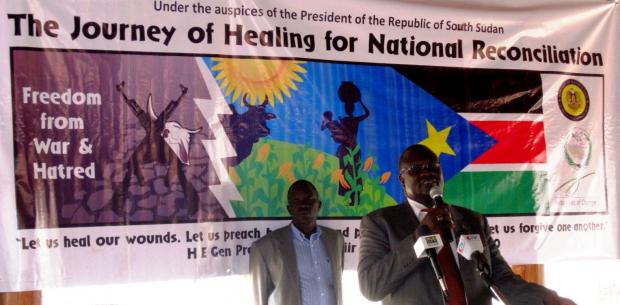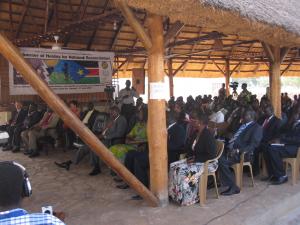Training of 200 Peace and Reconciliation Mobilizers Opened by Vice President
 In a ceremony in Juba on 8 April, Dr Riek Machar, Vice President of South Sudan, officially launched the training of 200 South Sudanese who will serve as peace and reconciliation mobilizers within communities all over the country over the coming years. In his remarks to the large gathering, H.E. Dr Machar began by turning to the event banner behind his podium and reading the words of H.E. President Salva Kiir Mayardit from 21 May 2010: 'Let us heal our wounds. Let us preach harmony and co-existence. Let us forgive one another'. The Vice President noted that: 'there is still bitterness in our hearts, there is still trauma in our minds'. He emphasized the long term nature of the government’s commitment to national reconciliation, stating 'we will keep budgeting for it as a government and we will keep asking our partners, whether Non-Governmental or private sector, to do the same'.
In a ceremony in Juba on 8 April, Dr Riek Machar, Vice President of South Sudan, officially launched the training of 200 South Sudanese who will serve as peace and reconciliation mobilizers within communities all over the country over the coming years. In his remarks to the large gathering, H.E. Dr Machar began by turning to the event banner behind his podium and reading the words of H.E. President Salva Kiir Mayardit from 21 May 2010: 'Let us heal our wounds. Let us preach harmony and co-existence. Let us forgive one another'. The Vice President noted that: 'there is still bitterness in our hearts, there is still trauma in our minds'. He emphasized the long term nature of the government’s commitment to national reconciliation, stating 'we will keep budgeting for it as a government and we will keep asking our partners, whether Non-Governmental or private sector, to do the same'.
The Vice President referred to the inclusive nature of the national reconciliation process, saying that 'it needs to involve all - faith-based organizations, political parties, civil society organizations, media, government at all levels… and even the private sector, which has realized that without national reconciliation its work cannot go forward'. The 200 trainee mobilizers are broadly representative of the South Sudanese public, including men and women from faith based organizations, civil society and political parties, along with ordinary citizens from all walks of life. Once trained, they will form a crucial element of the National Reconciliation Campaign, spreading awareness of reconciliation and addressing issues affecting their communities and peer groups. The current group are the first of several scheduled to receive such training over the next 1-2 years, to then be deployed to spread the message of peace and reconciliation in every community in the nation.
 Amina Dikedi-Ajikaiye, speaking for the Initiatives of Change International/Workshop for Africa, the bodies delivering the training, emphasized the primacy of building ethical leadership in their approach to the training. She recalled her days as a student in Nigeria and the moment when she herself had faced the central question 'how do we begin to shape the destiny of our nation', and expressed the hope that the current training would lead to similar questions in the minds of young South Sudanese, and a deep consideration of what they would be willing to do for their country once deployed.
Amina Dikedi-Ajikaiye, speaking for the Initiatives of Change International/Workshop for Africa, the bodies delivering the training, emphasized the primacy of building ethical leadership in their approach to the training. She recalled her days as a student in Nigeria and the moment when she herself had faced the central question 'how do we begin to shape the destiny of our nation', and expressed the hope that the current training would lead to similar questions in the minds of young South Sudanese, and a deep consideration of what they would be willing to do for their country once deployed.
Her hope was echoed by young South Sudanese, Khamis Kennedy who had everyone on their feet with his passionate rendition of a special song on forgiveness. 'I have made up my mind that I will not be part of the destruction of my country,' he said. 'We are building the foundations of a nation which will not discriminate against anyone, on the basis of tribe, religion or where they come from.' Then addressing the Vice President directly, he added, 'I am thrilled at the courage you have shown, with our President Salva Kiir Mayardit, in starting this process of healing. Together we will build this true journey of healing.'
The launch of the training programme represents the culmination of three months of work headed by the South Sudan Peace and Reconciliation Commission. 'The process of selecting, transporting and accommodating the 200 trainees has been complicated', said Hon. Chuol Rambang, Chair of the Commission, continuing: 'I am pleased by the hard work of the Commission’s State offices, which made the initial selections, and of the FBO, Civil Society and academic representatives who assisted with the final selection here in Juba. We are also grateful to UNMISS, whose assistance with transporting most of these trainees to Juba has been essential to the success of this effort.'
The launch took place at the impressive Multi-Service Training Centre (MTC). This is a government vocational training facility first opened in the 1970s, now run by the Ministry of Labour Public Service and Human Resource Development, and recently refurbished to modern standards with the help of JiCA, the Japanese International Co-operation agency. Acknowledging that there had been some teething problems in the early days at the new facility, the Vice President encouraged the trainees to view this as part of the training experience, advising 'reconcile yourselves to your accommodation and your difficulties. Reconcile yourselves to your room-mates. Forgive…'
The event was also attended by Hon. Mary Jervase Yak, Deputy Minister of Finance and Economic planning, Archbishop Dr. Isaiah Majok Dau of the Pentecostal Church, who sat on the mobilizer selection panel, Bishop Michael Taban Toro, the Chair of Sudan Council of Churches who is a part of the National Reconciliation Campaign’s regular leadership meeting, and Mr. Biel Butros Biel, Secretary General of the Civil Society Alliance, also a member of the selection panel, and Dr Jok Madut Jok, Undersecretary in the Ministry of Culture, Youth and Sport.
Report by Ayom Wol Dhal

